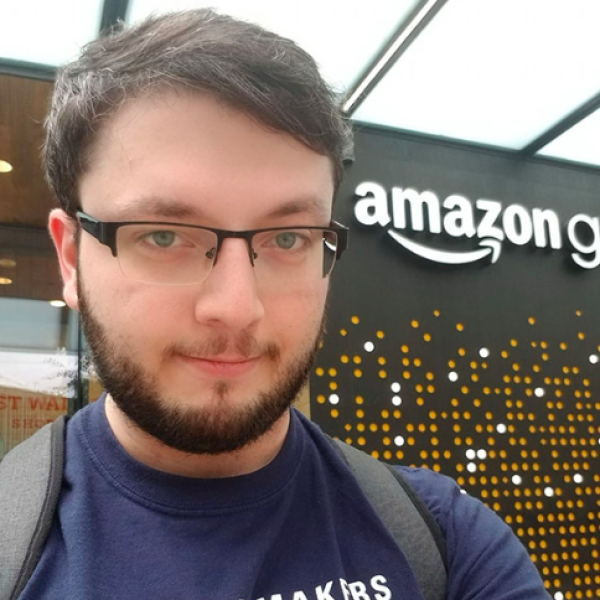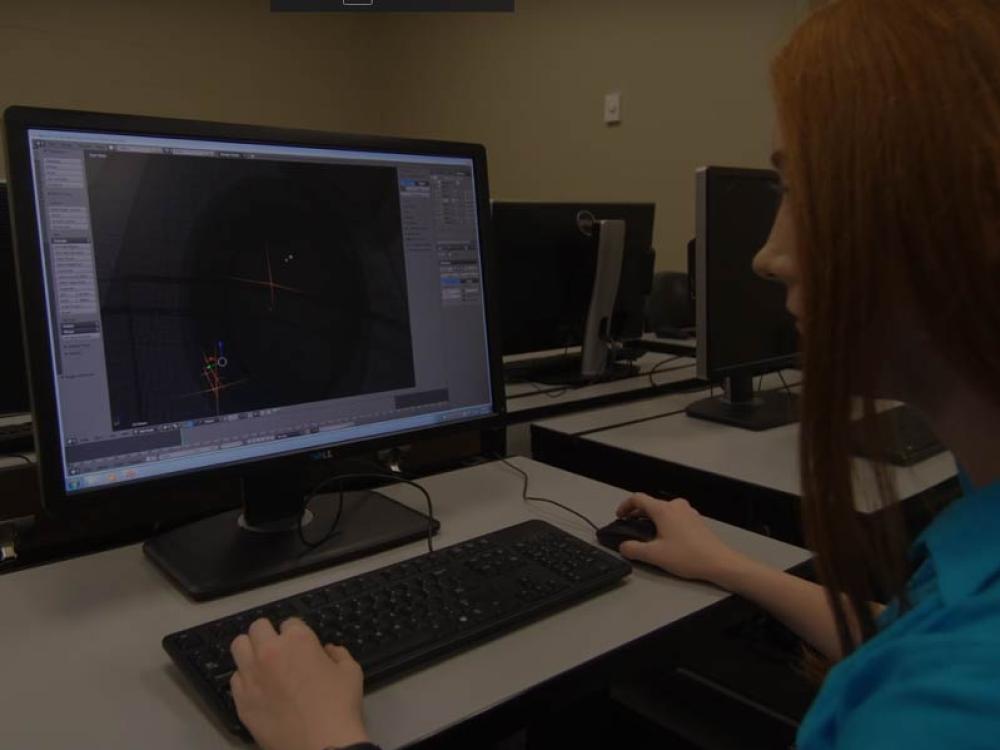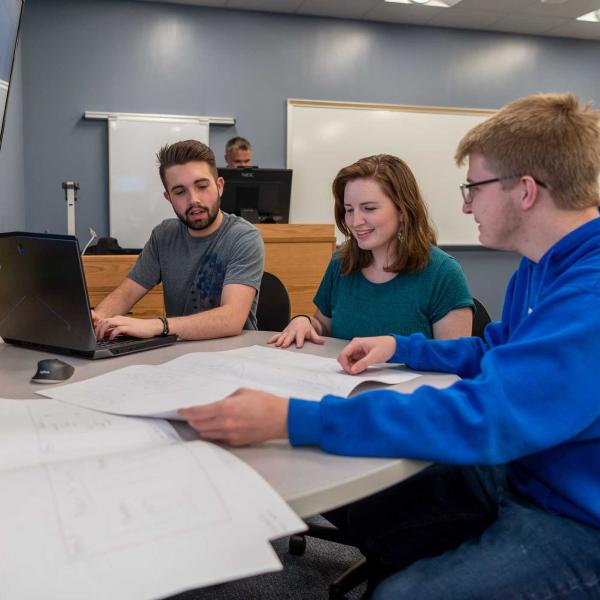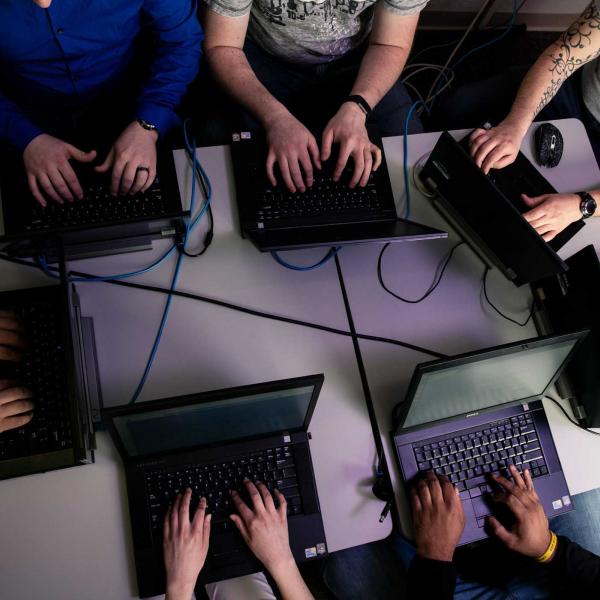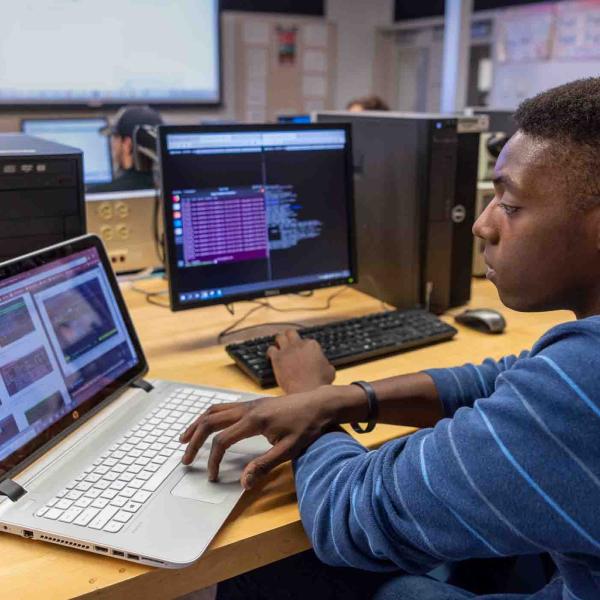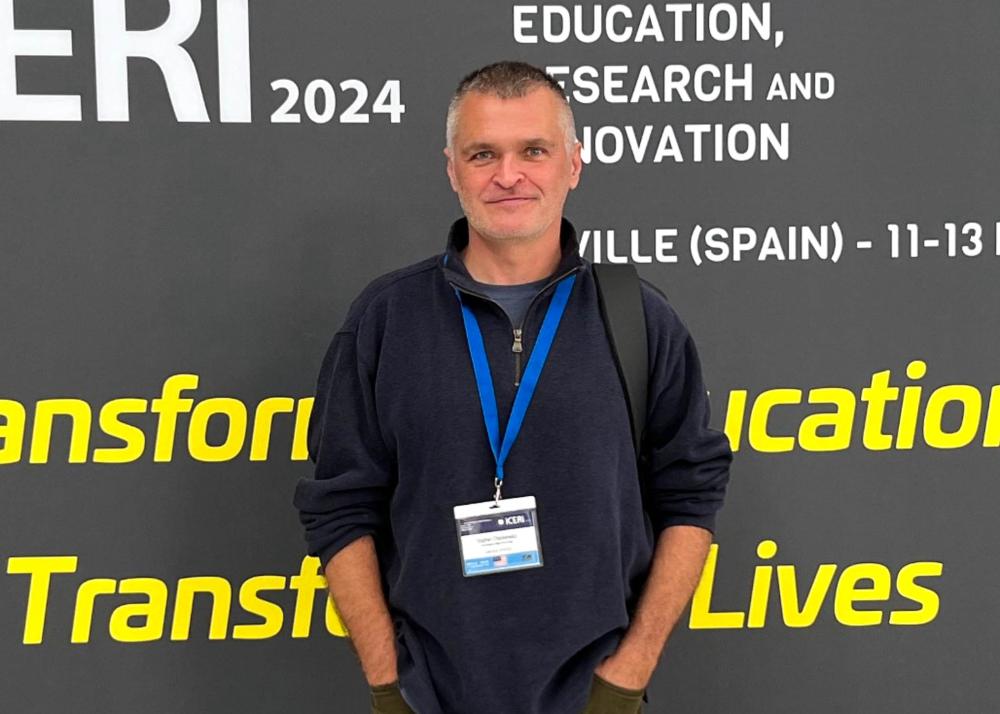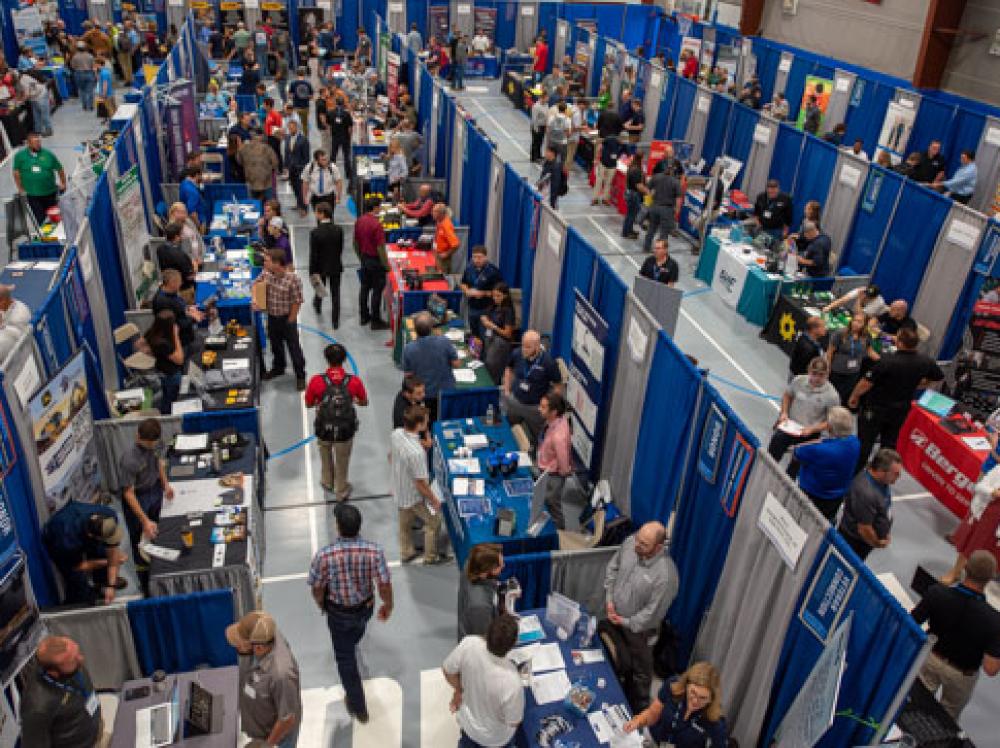Game & Simulation Programming

About this program
Whether you dream of launching the next epic video game or hope to make a difference with life-saving simulation programming, your path to a career in the field starts at Penn College. Specialized gaming and simulation design and programming coursework paves the way for a future in this thriving market that spans from commerce and entertainment to training and healthcare.

Careers
- Simulation developer
- Computer game programmer
- Software application developer
Courses
At Penn College, we believe your educational experience should go beyond specialized skills. Real-world ready means taking a broader approach that builds communication skills, inspires collaboration, and encourages exploration of arts, history, and science.
Specialization requires in-depth knowledge and high-level proficiency. Students learn and apply major-specific concepts, skills, and methods.
- Introduction to Programming (CIT160)
- Introduction to Gaming & Simulation (CSC132)
- Information, Technology & Society (CSC124)
- Interactive 3D Modeling (CSC142)
- Networking I (EET145)
- Programming II (CIT260)
- Introduction to Database (CIT180)
- Game & Simulation Design Principles I (CIT224)
- Data Structures & Algorithms (CIT360)
- System Analysis I (CIT246)
- Secure Database Development (CIT281)
- Discrete Structures in Computer Applications (CIT243)
- Game Programming (CIT216)
- Introduction to UNIX/Linux (CIT240)
- Game & Simulation Design Principles II (CIT324)
- Fundamentals of Information Security (CIT230)
- Game & Simulation Seminar (CIT444)
- Principles of Management (MGT115)
- Computer Simulation Applications (CIT412)
- Programming for Mobile Devices (CIT382)
- Web Systems & Technologies (CIT351)
- C++ Game Development (CIT365)
- Gaming & Simulation Capstone (CIT419)
- Operating Systems Concepts I (CIT344)
- Management of Organizational Behavior (MGT410)
Perspectives are points of view, offering a variety of ways of understanding, interacting, and influencing the world. Students identify, explain, and utilize the approaches used by academics and professionals to study, analyze, or understand problems, and offer solutions.
Foundations are the practical, intellectual, and social skills: communication, collaboration, critical and ethical thinking, quantitative thinking, and technological literacy that are crucial to every student at every stage of education and at every stage of life.
- Introduction to Gaming & Simulation (CSC132)
- Information, Technology & Society (CSC124)
- English Composition I (ENL111)
- Math Elective (MTH180 or Higher) (MTD)
- Interactive 3D Modeling (CSC142)
- Math Elective (MTH182 or Higher) (MTC)
- Technical & Professional Communication (ENL201)
- Fundamentals of Speech (SPC101)
- Linear Algebra (MTH255)
- Statistics for STEM Fields with Computer Applications (MTH161)
Next steps...
You're on your way to becoming a tomorrow maker.
What's the difference between Information Technology and Computer Science?
Computer science is more theoretical, with increased math requirements. Many tend to focus on programming or cutting-edge computing, like artificial intelligence and augmented reality.
IT is focused on supporting the user. It is more people-focused, making the tools of computing accessible to fit the needs of people and organizations, as well as creating computing tools and systems to meet the user's needs.
Virtual Tour
Information Technology
Get a glimpse inside the labs where future IT professionals learn how to install, configure, and maintain computing systems. Meet Dr. Sandra Gorka, Associate Professor of Computer Science. And check out everything from gaming and simulation spaces to the hands-on labs decided to cyber security, networking, database management, and Linux systems.

Facilities
Game & Simulation Labs
Apply theory to the real thing in our specialized IT labs. Here, you’ll have access to both physical and virtual labs designed for networking, IT security, operating systems, and gaming. Apply the principles of ethical hacking, intrusion detection, and digital forensics in both physical and virtual environments. Labs also allow students to create 3D models, investigate hypervisors, build networks from bare metal to full production, and simulate a host of applications and network configurations.
Maker Profiles
Featured Video
Women In STEM
What does it take to succeed in a STEM career? Curiosity. Critical thinking. A can-do spirit. And an educational experience that meets your passion head-on. Here, you’ll meet a community of innovators. Future pioneers who are learning by doing. Breathing new life into old concepts. Testing theories. And breaking barriers. Because the more you explore, the more you grow. And the bigger difference you can make.
Tour Schedule
Seeing is believing.
Think Penn College might be a good fit for you? Make plans to visit and discover what hands-on learning is all about.
More tour dates are on the way.
But let's customize a tour for you now. Call, chat, or email for options.
Related Programs
Follow your passion
Student Life
Lead and put your skills to the test

Game Development Club of Penn College
The Game Development Club is a platform to share lessons, news, updates, and discussions on the game development industry. The club encourages and assists students in the creation of individual and class-based game development and promotes professional development.

Gamers’ Guild
Gamers' Guild is devoted to the continued enjoyment of classic games ranging from pen and paper RPGs like Dungeons and Dragons to classic console games, such as Nintendo and other major game producers.

Student Organizations at Penn College
Your college experience is about more than the classroom. Join one of 65+ clubs and organizations, or create your own.
Penn College News
Tuesday, November 19, 2024
Penn College IT prof presents at international conference
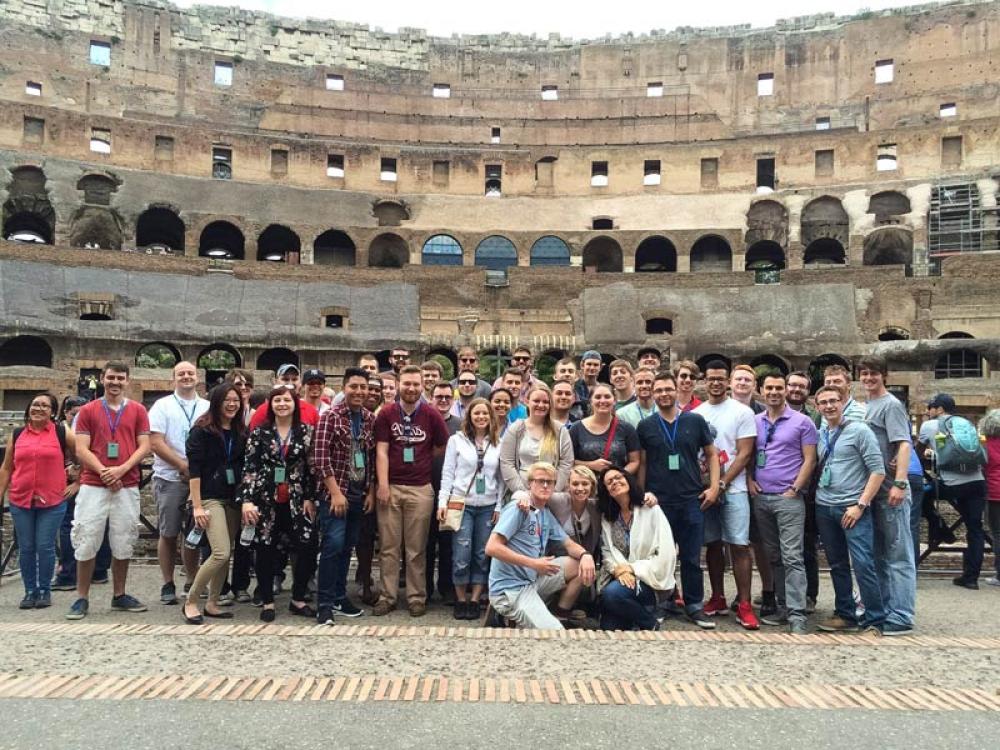
Study Abroad
Gain global experience
See the world via Williamsport. Take your education abroad and get hands-on experience learning about your industry on a global scale.
Internship
Your knowledge in practice
Internships are key for career preparation. Apply your knowledge to the workplace and learn about the industry first-hand.

Student Experience
The community as their classroom

Gaming student mentors teen
The gaming and simulation lab hosted WBRE-TV’s monthly segment that showcases children seeking a permanent family. James Temoshenko, shares his expertise with 13-year-old Mitchell.
More Information
Students must complete all required major courses in the Game and Simulation Programming major (those with the alpha-designators CIT, CSC, EET, and MTH) with a grade of “C” or higher.
Students seeking entrance through transfer into Game and Simulation Programming major should strive to take courses at their respective institutions that provide competency in the following areas: pre-calculus; programming (two semesters minimum - same language preferred); database; system analysis; and networking. Students transferring from institutions that have articulation agreements with Penn College should seek advisement from their respective institutions.
A laptop/notebook computer is required for enrollment in all Information Technology majors including the Game and Simulation Programming major. Laptop specifications
Uniforms and tools are available for purchase through The College Store and Penn State Computer Store .
Alternative Credit refers to academic credits earned through means other than traditional college course completion, including: credit by exam, articulation, proof of competency gained in high school, work/life experience, and advanced placement.
Visit the Alternative Credit Options page for requirements and procedures and for information on credit through Advanced Placement.
- Mr. James R Ankers, CISSP, CISA, IT Specialist (INFOSEC), United States Navy
- Mr. Daniel J Clarke, '07, Senior Solutions Architect, Arraya Solutions
- Dr. Todd W Griffith, Chief Technology Officer, Discovery Machine Corporation
- Mr. Brandon J Howe, '01, Sr. IT Analyst, Anadarko Petroleum Corp.
- Dr. Karl M Kapp, Assistant Director, Institute for Interactive Technologies, Bloomsburg University
- Dr. Krish Pillai, Ph.D., Assistant Professor, Lycoming College
- Mr. Mark J Watson, '85, Administrative Director, Corporate Information Technology, Susquehanna Health


